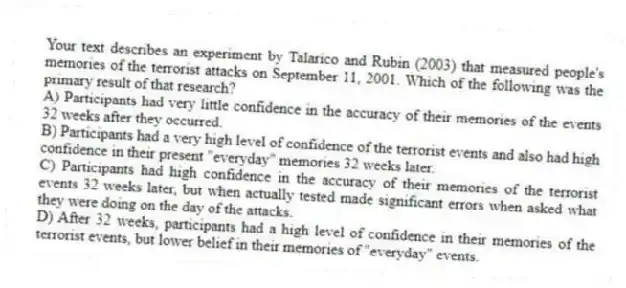
Your text describes an experiment by Talarico and Rubin (2003) that measured people's memories of the terrorist attacks on September 11, 2001. Which of the following was the primary result of that research?
A) Participants had very little confidence in the accuracy of their memories of the events 32 weeks after they occurred.
B) Participants had a very high level of confidence of the terrorist events and also had high confidence in their present "everyday" memories 32 weeks later.
C) Participants had high confidence in the accuracy of their memories of the terrorist events 32 weeks later, but when actually tested made significant errors when asked what they were doing on the day of the attacks.
D) After 32 weeks, participants had a high level of confidence in their memories of the terrorist events, but lower belief in their memories of "everyday" events.
Correct Answer:
Verified
Q5: Asking people to recall the most influential
Q6: Jacoby's experiment, in which participants made judgments
Q7: In the "War of the Ghosts" experiment,
Q8: The repeated reproduction technique used in memory
Q9: Flashbulb memory is best represented by which
Q11: Wei has allergy symptoms. He has gone
Q12: According to the _ approach to memory,
Q13: The "telephone game" is often played by
Q14: Stanny and Johnson's "weapons focus" experiment, investigating
Q15: Autobiographical memory research shows that a person's
Unlock this Answer For Free Now!
View this answer and more for free by performing one of the following actions

Scan the QR code to install the App and get 2 free unlocks

Unlock quizzes for free by uploading documents